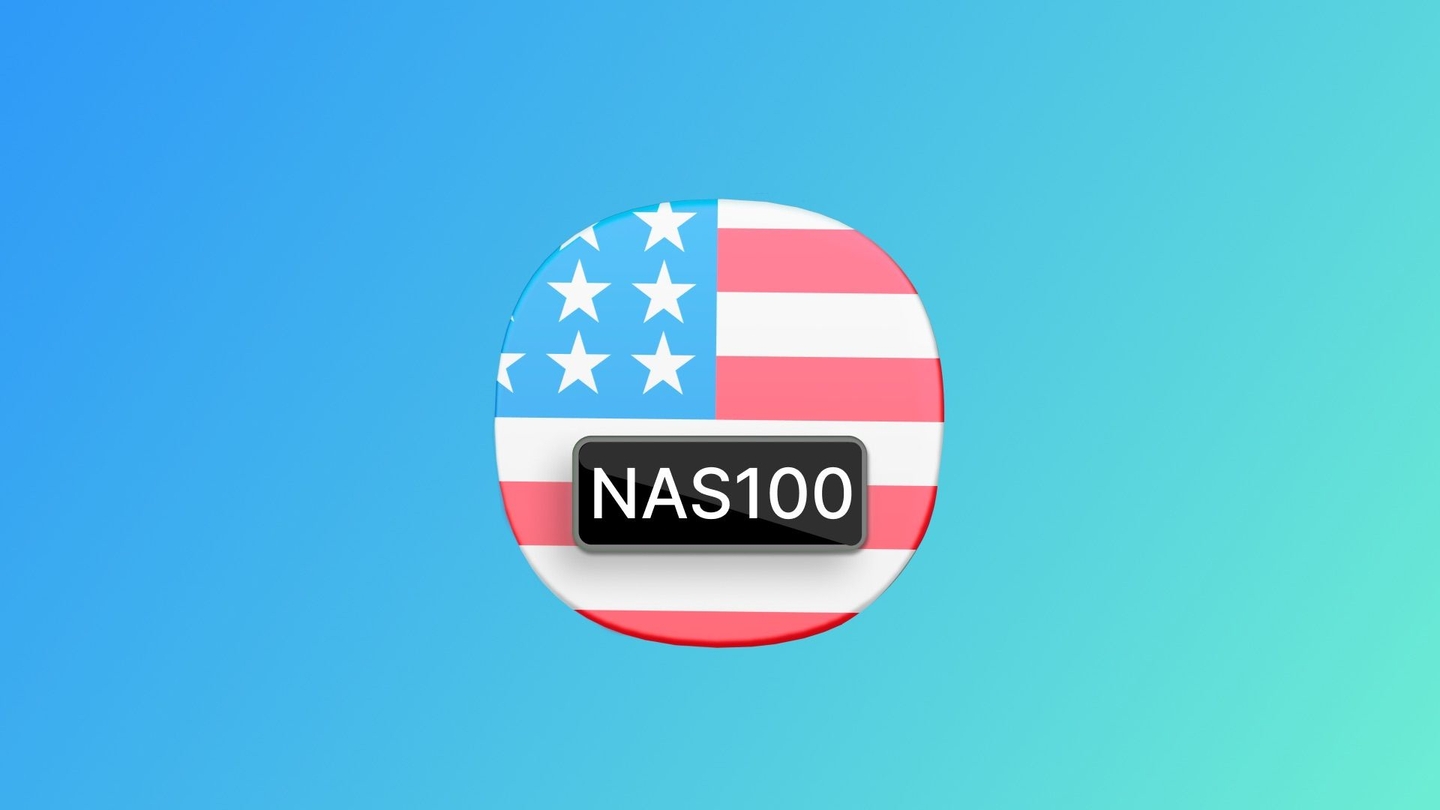Nasdaq 100 is one of the most heavily-traded indices worldwide. It comprises the largest US and international companies from various spheres, thus, is considered one of the important indicators of the global market state. In this article, you’ll find out more about this index, its history, constituent companies, how to trade it, etc.
What is the NASDAQ 100 Index?
Nasdaq 100 (abbreviated from the National Association of the Security Dealers Automated Quotation) is a market-cap-weighted index that consists of 100 major US and international companies from a big variety of spheres (except for the financial one) represented on the NASDAQ stock exchange. Some of the most well-known examples involve Apple, Google, Microsoft, and other companies from the technology sector. This is why Nasdaq 100 (or NAS100, NDX100) is often referred to as the US Tech-100 index.
History of NASDAQ 100 Index

In 1985 Nasdaq stock exchange (the second-largest exchange worldwide) created two indices. One of them was Nasdaq Financial-100, which comprised various types of banks, brokerage firms, investment companies, and other financial organizations. The other one was named Nasdaq-100. It included 100 companies from such spheres as technology, telecommunication, transportation, service, etc.
The NAS100 initial value accounted for 250 points. However, as time was going, it saw some crucial movements. One of the significant rises was recorded in 1999 when Nasdaq 100 reached the level of 3707 points. For the next two decades, it was moving with an uptrend, having approached 16320.08 points in 2021, this way, showing a 4000 point increase, compared to 2020.
How is the NASDAQ 100 Calculated?
Nasdaq 100 like many other major indices is calculated based on the market capitalization of its constituent companies. This implies that the index price is more influenced by large corporations rather than small companies. To calculate the NAS100 it’s necessary to find the total value of the index share weight of all 102 constituent stocks, multiply this number by each share closing price, and divide by a certain index divisor.

NDX100 is controlled by an exchange-traded fund, Invesco QQQ. This regulatory body conducts a quarterly review of the index performance to balance it by adding or taking out the companies from the Nasdaq composition, relying on their market cap value.
What Are the NASDAQ 100 Companies?
Nasdaq 100, as mentioned before, involves 102 stocks of 100 domestic and international actively-traded companies from different spheres, such as transportation (Tesla), services (Booking.com), healthcare (Moderna Inc.), and others. However, being also called a Tech-100 index, its main focus is on the largest technologically-oriented companies like Microsoft, Intel, Zoom Video Communication, etc. As of February 2022, the top 10 companies by weight featured on NAS100 include:
- Apple Inc;
- Microsoft Corp;
- Amazon.com Inc;
- Alphabet Inc (GOOG);
- NVIDIA Corp;
- Tesla Inc;
- Alphabet Inc (GOOGL);
- Meta Platform Inc;
- Broadcom Inc;
- Cisco System Inc.
Criteria for Eligibility
To be added to Nasdaq 100 index, companies have to comply with a particular list of requirements. They need to:
- be listed only on the NASDAQ stock exchange. All types of securities are eligible: common stock, ordinary shares, tracking stocks, etc.
- have an average daily trading volume not less than 200000 shares;
- be classified as non-financial;
- provide quarterly and annual reports;
- have no more than 24% in the index weighting;
- be free from any bankruptcy proceedings.
NAS100 is reviewed and rebalanced quarterly in March, June, September, and December while index reconstitutions are published in December.
NAS100 Performance
Driven by the innovations and the sound development of its constituent companies, Nasdaq 100 annual performance has seen a significant surge of +702.29% in the last 10 years. Moreover, it continues reaching new heights, outperforming other popular indices like S&P 500.
Although NAS100 has proven to be a great investment with a constant bullish trend throughout the last decade, it’s necessary to remember that the financial market is quite volatile and prone to unexpected price movements. Therefore, once having decided to diversify your portfolio with any asset, including NDX100, it’s reasonable to stick to a well-considered risk management plan.
Importance of the NASDAQ 100 Index
NAS100 is a widely traded index that represents the state not only of the US economy but also of the global stock market. It comes with merits for both investors and companies featured on it. The first ones can use the index to identify top companies worth investing in, this way taking advantage of increased potential returns. The companies, in turn, once being added to such a prestigious stock market index can gain an excellent reputation and increase their chances for success.
How to Invest In the NASDAQ 100 CFD
Investors can trade Nasdaq 100 index CFD in many different ways. Here are the most common of them.
- Directly using CFDs. It’s possible to get exposure to NAS100 companies through a single trade. CFD trading allows investors to open larger positions without depositing much capital. However, it’s crucial to be aware that both profits and losses are calculated based on full position value, implying both higher potential returns and losses.
- Nasdaq 100 CFDs on Exchange-Traded Funds (ETFs). ETFs represent a basket of constituent index securities but are traded as a single instrument. There are two main ETFs focused on the Nasdaq 100 performance: Invesco QQQ (QQQ) and the Invesco Nasdaq 100 ETF (QQQM).
- Futures. Nasdaq 100 CFDs futures (such as E-mini, TAIFEX, etc.) let investors buy or sell contracts on the NAS100 at a set price and future date. They are efficient instruments coming with tight spreads, high liquidity, robust hedging, etc.
How to Trade the NASDAQ 100 CFD
Before diving into your Nasdaq 100 investment experience, it’s necessary to explore everything that defines this trading instrument: factors, influencing its price fluctuations, index trading hours, existing trading platforms, etc.
What Factors Affect the NASDAQ 100 Price?
When trading NAS100 CFD, it’s necessary to develop your strategy, taking into account the factors making the index price move up or down. They include, yet are not limited to:
- Price of the constituent shares. Every stock forming the index has a certain influence on its price. Since Nasdaq 100 is a market-cap-weighted index, companies with a larger weight have a greater impact on its market movements.
- Fundamental factor. Geopolitical events, domestic and international economic factors such as interest rates, inflation, monetary policy, exchange rates, etc. can result in NAS100 increases or drops in value.
- Investors sentiment. Significant moves in the stock price of the top 10 NAS100 constituent companies can attract the attention of many speculators, who, in turn, may push other investors to follow their example of short or long trading.
Trading Nasdaq 100 CFD suggests the use of both fundamental and technical analysis. Some of the popular technical indicators include Moving Averages (such as MACD), support and resistance price patterns, trend lines, etc.
NASDAQ 100 Trading Hours
When it comes to NAS100 CFDs on ETFs, they are traded following the working hours of the NASDAQ stock exchange:
- Pre-market: from 4.30 am to 9.30 am (ET);
- Market Hours: from 9.30 am to 4 pm (ET);
- After-market: from 4 pm to 8 pm (ET).
NAS100 futures are mostly traded on CME, whose trading hours are:
- from Sunday 6 pm (ET) to Friday 5 pm (ET).
NASDAQ 100 Trading
Once having explored the distinguishing features of trading the Nasdaq 100 index and developed a trading strategy based on your investment style, results of technical and fundamental analysis, it’s necessary to opt for the platform supporting NAS100 trading.
Naga is one of the leading social trading platforms, offering investors various ways to trade Nasdaq 100 index: directly, via futures, ETFs, etc. This reliable broker provides its users with a big choice of robust trading instruments, a high level of security, numerous methods of payment, a copy trading feature, and much more. All you need to do to start your Nasdaq 100 trading journey with Naga is:
- Create an account;
- Pass through an easy verification process;
- Fund your account via various possible ways (debit/credit card, wire transactions, e-wallets, etc.);
- Start trading.


